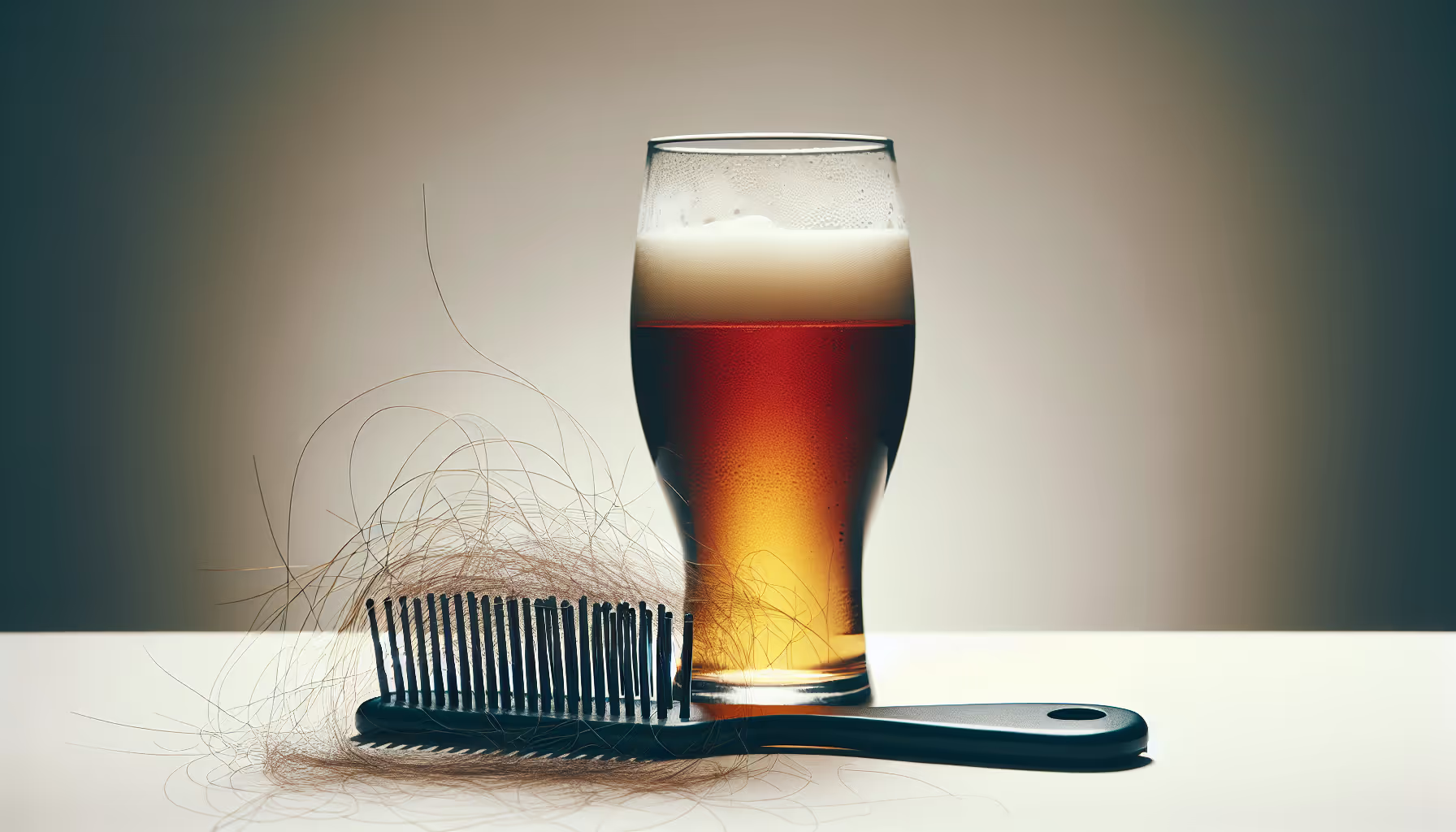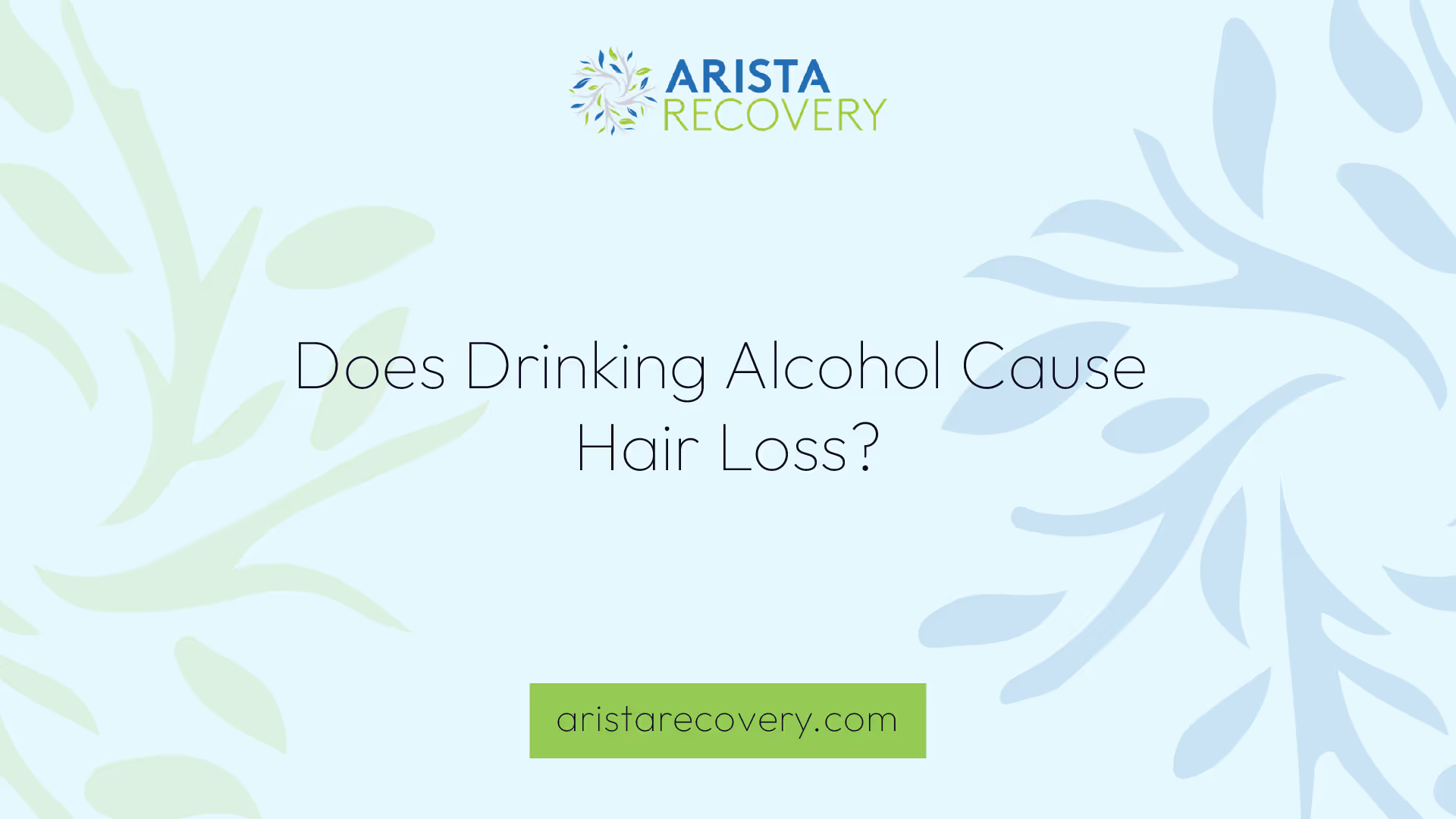Does Drinking Alcohol Cause Hair Loss?

Alcohol's Impact on Hair Health
When it comes to understanding the link between alcohol and hair health, many people might ask, "Does drinking alcohol cause hair loss?" While alcohol consumption does not directly cause hair loss, it can lead to conditions that contribute to hair thinning and shedding. Two key areas of impact are nutritional deficiencies and hormonal interactions.

Nutritional Deficiencies and Hair Shedding
Excessive alcohol consumption can lead to nutritional deficiencies, affecting hair health and contributing to hair shedding. Drinking too much alcohol can contribute to deficiencies or malabsorption of key nutrients like zinc, copper, and protein [1]. These nutrients are essential for hair growth and maintenance, and their deficiency can lead to hair shedding.
Furthermore, excessive drinking can decrease the consumption of iron-rich foods, potentially affecting hair health. Iron deficiency has been suggested as a factor in a certain type of hair loss in women.
Alcohol can interfere with the absorption and utilization of essential vitamins and minerals necessary for healthy hair growth, such as vitamin D, vitamin E, vitamin B complex, zinc, and iron [2].
Hormonal Interactions and Hair Thinning
In addition to nutritional deficits, heavy drinking can also impact hormonal health. Alcohol can interfere with the functioning of the thyroid glands, which are responsible for regulating the hair growth cycle and hair shedding.
Severe or long-lasting hypo- and hyperthyroidism, conditions that can result from excessive alcohol consumption, may lead to hair loss and thinning across the scalp.
Moreover, alcohol addiction has been strongly linked with mental health conditions like anxiety and depression, which can lead to telogen effluvium, a type of temporary hair loss that usually regrows when the underlying cause is addressed.
Thus, while alcohol consumption does not directly cause hair loss, its impact on nutritional and hormonal health can contribute to conditions that lead to hair thinning and shedding. It is important to consult a doctor about any hair condition and its potential causes, especially if there is a history of heavy alcohol use.
Specific Nutrient Deficiencies
Taking a closer look at the question, "does drinking alcohol cause hair loss?", it's important to consider how alcohol can contribute to nutrient deficiencies that may impact hair health.
Zinc and Copper Deficiency
Drinking too much alcohol can lead to a decrease in the body's absorption of essential nutrients like zinc and copper, two minerals that play vital roles in hair health. Lack of these nutrients can manifest as hair shedding, a common issue among heavy drinkers [1].
Zinc is crucial for tissue growth and repair, which includes the hair follicles. Meanwhile, copper helps with the production of melanin, the pigment that gives hair its color. An imbalance in zinc and copper levels in the body can therefore result in various forms of hair loss.
Protein Absorption and Hair Health
Protein is another nutrient that is essential for hair health. It constitutes a major component of hair strands, and deficiency can lead to thinning hair or hair loss. Drinking alcohol can interfere with the absorption of protein in the body or lead to lower protein consumption, resulting in skin, hair, and nail issues.
Iron Intake and Hair Health
Excessive drinking can result in a decrease in the consumption of iron-rich foods, which can potentially affect hair health. Iron is vital for hair growth, and its deficiency has been suggested as a factor in a certain type of hair loss in women.
In summary, alcohol's role in nutrient deficiencies is a critical factor in understanding its potential impact on hair health. This knowledge can help individuals and families affected by substance abuse in Kansas to make informed decisions about their health.
Alcohol's Influence on Essential Nutrients
Alcohol consumption, especially when excessive, can have a detrimental impact on essential nutrients that are crucial for hair health. It can lead to deficiencies or malabsorption of key nutrients such as zinc, copper, and protein, which can in turn result in hair shedding [3].
Vitamin D, E, and B Complex
Vitamin D, E, and B complex are crucial for hair growth and health. However, excessive alcohol consumption can interfere with the absorption and utilization of these vitamins, leading to deficiencies. Deficiencies in these vitamins have been linked to hair shedding and thinning.
Zinc and Iron Absorption
Zinc and iron are essential minerals for maintaining hair health. However, alcohol may affect their absorption, leading to deficiencies. A lack of zinc and iron in the body can significantly impact hair health, leading to hair loss.
Heavy alcohol consumption can lead to absorption issues or a high loss of zinc, which is essential for hair health. Zinc deficiency caused by alcohol consumption can contribute to hair loss.
Impact on Vitamin Utilization
In addition to affecting nutrient absorption, alcohol can also disrupt the body's ability to utilize these nutrients effectively. This means that even if these nutrients are present in sufficient amounts in the body, their benefits may not be fully realized due to alcohol's impact.
Excessive alcohol intake can disrupt the absorption of essential nutrients necessary for healthy hair growth, such as zinc, copper, and protein, leading to deficiencies that can contribute to hair shedding and thinning [4].
In conclusion, while moderate alcohol consumption may not have a significant impact on hair health, excessive alcohol consumption can lead to deficiencies in essential nutrients and disrupt the body's ability to utilize these nutrients, potentially leading to hair loss. Thus, moderating alcohol intake is crucial in maintaining optimal hair health.
Thyroid Function and Hair Loss
While exploring the question, "does drinking alcohol cause hair loss?", it's crucial to delve into how alcohol impacts the thyroid glands, which play a vital role in hair health. By understanding this impact, you can better comprehend how hypo- and hyperthyroidism might contribute to hair loss.
Alcohol's Effect on Thyroid Glands
Drinking too much alcohol on a regular basis can significantly affect the thyroid glands. These glands are responsible for regulating processes in the body, such as hair growth and shedding. Heavy drinking, such as binge drinking, can disrupt the functioning of the thyroid glands, leading to imbalances in the hair growth cycle and increased hair shedding [3].
Moreover, excessive alcohol consumption can disrupt the hypothalamic-pituitary-thyroid (HPT) axis. This disruption has a detrimental effect on the thyroid gland, leading to conditions like hypothyroidism or hyperthyroidism. Both these conditions can result in hair loss.
Additionally, alcohol can influence estrogen levels in both men and women. In men, elevated estrogen levels can lead to hair loss, thinning, and balding patches. High estrogen levels in men are directly associated with hair loss.
Hypo- and Hyperthyroidism and Hair Health
Hypothyroidism and hyperthyroidism are conditions that can stem from excessive alcohol consumption. Severe or long-lasting cases of these conditions may lead to hair loss and thinning across the scalp.
Hypothyroidism is a condition where the thyroid gland is underactive and doesn't produce enough thyroid hormones. This deficiency can slow down the metabolism, leading to symptoms like fatigue, weight gain, and hair thinning or loss.
On the other hand, hyperthyroidism is a condition where the thyroid gland is overactive and produces too much thyroid hormone. This overproduction can speed up the metabolism, leading to symptoms like rapid weight loss, irregular heart rate, and hair loss.
It's important to note that while alcohol consumption can exacerbate these conditions, it is not the sole cause. Diet, stress, genetic factors, and other health conditions can also contribute to the development of hypo- and hyperthyroidism. As such, if you're experiencing hair loss and suspect it might be related to thyroid function, it's important to consult with a healthcare professional for a thorough evaluation and appropriate treatment.
In conclusion, regular and heavy alcohol consumption can have a significant impact on the thyroid gland and its function, potentially leading to conditions that cause hair loss. Therefore, moderating alcohol intake can be an important step towards maintaining healthy hair and overall health.
Study Findings and Hair Loss
As scientists continue to investigate the question, "does drinking alcohol cause hair loss?", several studies have uncovered connections between alcohol consumption and hair health.
Association with Alopecia Areata
Alopecia Areata, an autoimmune disorder that causes hair to fall out in small patches, has been found to have a complex relationship with alcohol consumption. According to a study published by the National Center for Biotechnology Information (NCBI), regular alcohol consumption has been associated with a lower risk of alopecia areata. However, other studies indicate there may be a link between heavy alcohol consumption and alopecia areata [3]. The discrepancy indicates a need for further research to understand the specific mechanisms and conditions under which alcohol consumption might impact this type of hair loss.
Linkages to Different Types of Hair Loss
Beyond alopecia areata, studies suggest that the relationship between alcohol consumption and other types of hair loss may stem from nutritional deficiencies. Alcohol can cause deficiencies in essential nutrients like zinc, copper, iron, and protein. If a deficiency develops, it may lead to hair shedding.
Moreover, excessive alcohol intake can disrupt the absorption of these nutrients necessary for healthy hair growth, leading to deficiencies that can contribute to hair shedding and thinning.
These findings suggest that while the connection between alcohol and hair loss might not be direct, alcohol's impact on nutrient absorption and overall health can indirectly influence hair health. However, more research is required to fully understand the nuances of alcohol's impact on different types of hair loss.
Alcohol Sensitivity and Hair Conditions
In addition to the direct effects of alcohol consumption on hair health, certain health conditions can influence how our bodies react to alcohol, potentially exacerbating the impact of alcohol consumption on hair loss. This section will focus on two such conditions: Post-acute sequelae of SARS-CoV-2 (PASC) and ME/CFS (myalgic encephalomyelitis/chronic fatigue syndrome).
Post-acute sequelae of SARS-CoV-2 (PASC)
PASC, also known as long COVID or post-acute COVID-19 syndrome, has been linked to new-onset alcohol sensitivities in some patients. Following their recovery from COVID-19, these individuals have reported symptoms such as headaches, fatigue, brain fog, and hangover-like symptoms after consuming alcohol. This heightened sensitivity may exacerbate the impact of alcohol on hair health, potentially accelerating hair loss or thinning.
While more research is needed to understand the exact mechanisms behind this phenomenon, it underscores the complex effects that diseases like COVID-19 can have on our bodies, and how these effects can interact with lifestyle factors like alcohol consumption.
ME/CFS and Alcohol Sensitivity
ME/CFS, a chronic condition characterized by extreme fatigue, pain, and other symptoms, has also been linked to alcohol sensitivity. Patients with ME/CFS are reportedly more likely to experience alcohol sensitivity, and those with alcohol sensitivity tend to report more overall symptoms compared to those without.
The mechanism behind this increased sensitivity to alcohol may be related to factors such as orthostatic intolerance, autonomic dysfunction, neuroinflammation, changes in the gut microbiome, and mitochondrial dysfunction. These factors can potentially amplify the effects of alcohol on the body, including its impact on hair health.
In summary, certain health conditions, including PASC and ME/CFS, can influence how our bodies react to alcohol. These reactions can potentially exacerbate the impact of alcohol on hair health, further underscoring the importance of moderation and careful consideration when it comes to alcohol consumption.
References
[1]: https://www.healthline.com/health/alcohol-and-hair-loss
[2]: https://www.northstarbehavioralhealthmn.com/resources/does-drinking-alcohol-cause-hair-loss
[3]: https://wimpoleclinic.com/blog/hair-loss-and-alcohol-is-there-a-link/
[5]: https://www.medicalnewstoday.com/articles/is-alcohol-bad-for-your-hair
You’re not alone in this.
When mental health challenges and addiction intersect, it can feel isolating. At Arista, we offer compassionate, evidence-based, and trauma-informed care to help you heal, grow, and move forward.
You’re not alone in this.
When mental health challenges and addiction intersect, it can feel isolating. At Arista, we offer compassionate, evidence-based, and trauma-informed care to help you heal, grow, and move forward.
Support that moves with you.
You’ve taken a brave first step. At Arista Recovery, we’re here to help you continue with best-in-class care designed for long-term healing and support.
.webp)






